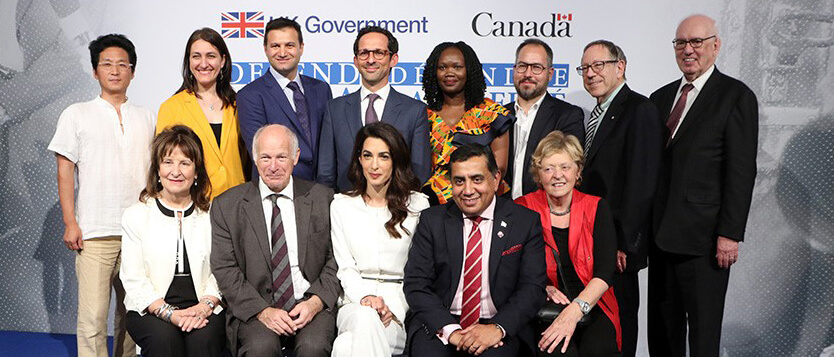To mark the occasion of World Press Freedom Day on 3 May, the High Level Panel of Legal Experts on Media Freedom has issued a statement on the challenges posed to media freedom in the context of the Covid-19 pandemic. The High Level Panel is an independent body convened in July 2019, at the request of the United Kingdom and Canadian governments to advise governments on ways to prevent and reverse abuses of media freedom, as well as ensuring existing international obligations relating to the freedom of expression are upheld.
The High Level Panel is comprised of a diverse group of leading lawyers from around the world. The Chair is Lord Neuberger of Abbotsbury and the Deputy Chair is Amal Clooney, the UK’s Special Envoy on Media Freedom. The International Bar Association’s Human Rights Institute (IBAHRI) acts as Secretariat to the High Level Panel.
The statement appears below. A PDF of it can be downloaded from here.

The High Level Panel of Legal Experts on Media Freedom (the Panel) recognises that the current Covid-19 pandemic has created an unprecedented challenge across the world. This has in turn required exceptional measures by governments to halt the rapid spread of the virus, including measures that impact freedom of movement, freedom of assembly and the right to privacy. While we recognise the challenges that states face in responding to the pandemic, we urge governments to ensure that if any encroachments on press freedom or any other human right are needed, they are limited to what is strictly necessary in the present crisis and are revoked when it abates.
The Panel recognises that false information about the Covid-19 virus is dangerous and can even be deadly, especially when it is spread by governments themselves. But the use of laws purportedly passed to deal with misinformation to silence critical reporting is also dangerous. As the UN High Commissioner for Human Rights has reported, ‘some States have used the outbreak of the new coronavirus as a pretext to restrict information and stifle criticism’.
In what has been called a ‘Covid Crackdown’, over 40 journalists have been arrested or charged around the world following critical reporting on governments’ responses to the pandemic, or even for simply questioning the accuracy of case numbers or death tolls. Many governments have introduced or expanded laws criminalising so-called ‘fake news’ on the pandemic, including, in some cases, by imposing prison terms of up to 20 years. Many of the pre-existing challenges facing the press have also been exacerbated during this period, including in some western democracies. Around the world, journalists reporting on the virus have been berated at news conferences, had their credentials revoked, the printing of their newspapers banned and their news outlets closed. Some journalists have also reportedly disappeared after publishing coverage critical of the Covid-19 response.
At times of crisis, access to good, fact-checked information and independent, trusted media sources is more important than ever. Whilst international human rights law can allow for restrictions on individual rights in the context of serious public health threats and emergencies, they are only justified when they have a legal basis, are strictly necessary and proportionate to the danger they address, and subject to independent review. We are concerned that a growing number of governments are taking measures that go far beyond that limit, by adopting or extending their emergency powers that fall outside of the legal standard, failing to provide adequate measures for review or failing to include sunset clauses. It is also vital that governments are transparent in their practices and adhere to the principles of democratic accountability.
We are also troubled by the widespread disinformation brought about by the pandemic, which is exacerbating existing tensions, putting the health of the public at risk and leading to violent attacks on those accused of being the source of the disease who are usually from minorities. However, the misuse of ‘fake news’ laws, and censorship of reporting and online content critical of the government, denies citizens access to critical information on the spread of the virus and undermines public trust in government. We therefore urge governments to take a different course: to work together and with social media companies to address the spread of disinformation by providing reliable content and supporting scientifically informed messaging from public health experts.
We must face this extraordinary challenge with full respect for the rule of law, human rights and democracy. This means that governments that have detained journalists simply for doing their job must release them and that states that have passed laws that violate international human rights standards should repeal them as soon as possible.
ENDS
Notes to the Editor
-
The International Bar Association’s Human Rights Institute (IBAHRI), acts as Secretariat to the Panel. For more information, visit here.
-
The International Bar Association (IBA), the global voice of the legal profession, is the foremost organisation for international legal practitioners, bar associations and law societies. Established in 1947, shortly after the creation of the United Nations, it was born out of the conviction that an organisation made up of the world's bar associations could contribute to global stability and peace through the administration of justice.
-
The IBAHRI, an autonomous and financially independent entity, works to promote, protect and enforce human rights under a just rule of law, and to preserve the independence of the judiciary and the legal profession worldwide.
For further information please contact: